If you are considering moving to Canada, Prince George, British Columbia is a beautiful place to call home. It’s a great location if you prefer a smaller city, a rural setting, and the outdoors. Where you choose to live will greatly impact your social, personal, financial, and professional outcomes. It’s wise to carefully explore your destination city options. Use this guide and get helpful information about living in Prince George, B.C.
About Prince George, British Columbia
Prince George is the “Northern Capital” of British Columbia. It’s the largest city in the northern area of the province. Situated at the confluence of the Fraser and Nechako Rivers and the crossroads of Highway 16 and Highway 97, Prince George is a service and supply hub and plays a vital role in British Columbia’s economy and culture. Many skilled immigrants choose Prince George as their home in Canada, because of its safe, embracing community, and easy lifestyle. Its economy is experiencing steady growth with an influx of new businesses in the community.
The city has roots dating back to 1807 when it was originally established as a fur trading post named for George. It was set up by Simon Fraser in the name of King George III. It was officially incorporated as a city in 1915.
How Many People Live in Prince George, British Columbia?
Prince George has a population of 76,708 people as of the 2021 Census. The population has grown 3.7% since 2016. Overall, the population has remained about the same since the mid-1990s. The city’s Aboriginal community comprises 15% of the population.
How to Find a Job & Build a Career in Prince George
Prince George’s Local Economy
The service industries dominate Prince George’s economy. Previously, the forestry sector was the dominant one. The city’s education sector also contributes about $800 million to the local economy every year.
The area is seeing sawmill closures and the creation of ‘super mills’. More closures are expected to follow, and some see mining exploration and development as the future of Prince George.
The city is a staging centre for mining and prospecting, and major regional transportation, trade, and government hub. Several major retailers are increasing their presence in the Prince George region.
The top industries in Prince George are:
- Forestry
- Construction
- Manufacturing
- Professional services
- Transportation and warehousing.
Major Employers in Prince George
Prince George is home to a diverse range of businesses. Some top employers include:
- Canfor Pulp
- Canfor Wood Products
- Government of BC
- Government of Canada
- Northern Health
- TELUS
- University of Northern British Columbia.
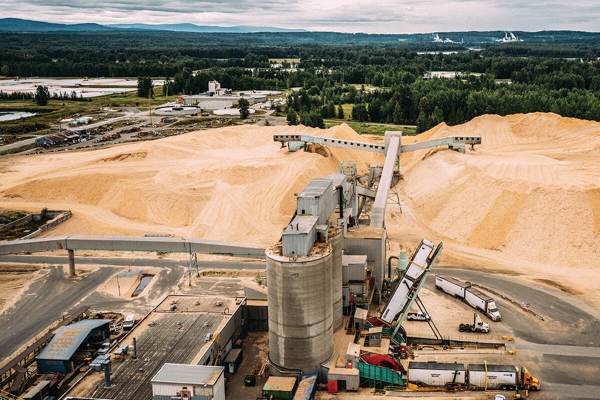
Career Pathways in Prince George
You can search for job opportunities on the Move Up Prince George website. You can also look for jobs using bcjobs.ca and WorkBC or use a local recruitment agency to find work.
The Housing Market in Prince George
Prince George offers housing options in many neighbourhoods. You can look to rent or buy in areas such as Austin East & West, Blackburn, Chief Lake, College Heights, Cranbrook Hill, Crescents, Downtown, East Central Fort George, Fraserview, Hart Highlands, Lansdowne, Perry, South Fort George, Van Bow, Van Bien, and West Bowl.
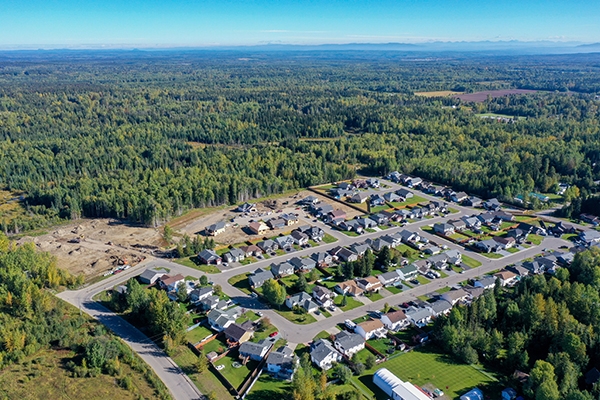
Is Housing Expensive in Prince George, British Columbia?
Prince George is an affordable city. It is consistently cheaper to rent or buy a home than other mid-size cities in B.C. and across Canada. Its cost of living is more affordable than most cities in the country.
Finding a Place to Rent in Prince George
Renting an apartment or housing unit is a common first step for newcomers. The average rent for an apartment in Prince George is $950 for a 1-bedroom and $1,400 for a 3-bedroom.
Use Rentals for Newcomers to search for available rental units. Here, you can also find current rental prices in Prince George. When renting a home or apartment, it’s also important to consider buying  . This will provide you with added protection for your home if it were to be damaged.
. This will provide you with added protection for your home if it were to be damaged.
Get more information about renting a home: Renting in Canada: What Newcomers Need to Know.

Buying a Home in Prince George
Housing prices in Prince George are on the rise. But the city is still more affordable than other cities in B.C. such as Vancouver, Surrey, and Delta.
According to the BC Northern Real Estate Board, the average selling price for a home in Prince George is $519,979, as of March 2022. This is up from $450,901 in March 2021. Find out more about buying your first home in Canada: First Time Home Buyer: Newcomer Tips.
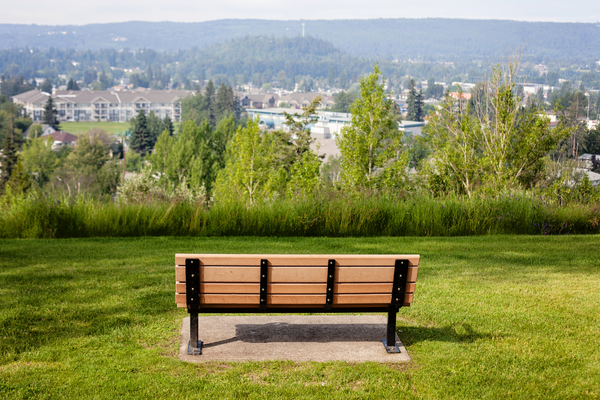
Driving & Public Transit in Prince George
Driving in Prince George, British Columbia
The city serves as a transportation hub for Northern B.C. You can expect a high volume of commercial traffic. Roads are in a grid formation. If you live in one of Prince George’s residential areas, your largest commute downtown will be about 15 minutes.
All drivers must have a valid British Columbia driver’s licence to operate a vehicle.
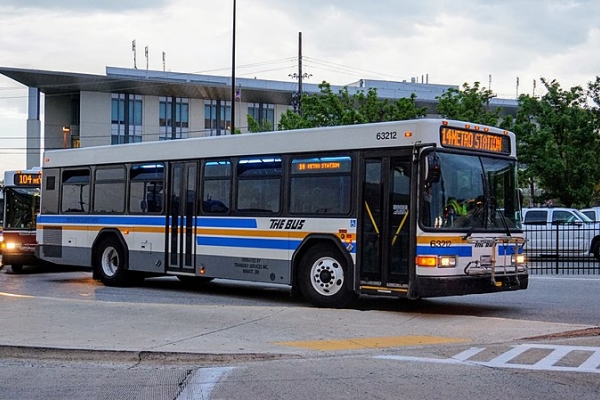
Prince George Public Transit
Prince George Transit System, or PG Transit, provides public transit. Click here to find the current cost for fares including a monthly pass. Purchasing a monthly pass offers a discount for unlimited travel throughout the month. This may be more cost-effective if you plan to use public transit often.
Prince George Airport is in the southern part of the city. With its international airport (YXS), VIA Rail daylight passenger train service, Greyhound Bus and good highway infrastructure, Prince George is a convenient transit hub.
The primary air connection to the rest of the world is provided by multiple daily flights out of YXS to Vancouver on Air Canada and WestJet. A few smaller airlines and charter flights fly to regional and smaller centres.
Greyhound Bus Lines supplies daily bus service south to Vancouver, west to Prince Rupert, east to Edmonton, Alberta and north to Fort St. John.
Get more information about driving in Canada:
Driving in Canada: 10 Essential Facts to Know
Driving Test in Canada: A Full Guide
Tips for Winter Driving to Ensure Your Safety
Community Support for Newcomers
Newcomers to Prince George have access to community support through organizations such as:
- Immigrant and Multicultural Services Society (IMSS)
- Immigrant Services Society of BC – Career Paths for Skilled Immigrants
- Le Cercle des Canadiens Français de Prince George – Welcoming Francophone Community
- Library Champions Online
- Northern Immigration Services (NIS)
- Multicultural Heritage Society of Prince George
- Immigrant Employment Council of BC.
Newcomers may also be eligible for the Introduction to British Columbia program through the Immigrant Services Association of British Columbia. Find out more about Services in Canada to Help Newcomers Settle.
Language Support in Prince George
New immigrants can access language support programs through community settlement agencies such as The Immigrant and Multicultural Services Society (IMSS), and WelcomeBC.
Personal Finance & Banking
Opening a bank account and organizing your finances is an important step when settling into a new community. All banks and credit unions offer services for newcomers to help them open a bank account. You can also apply for a credit card, line of credit, and even a mortgage. Visit a local branch to get started.
Get more banking tips for newcomers:
Top 10 Financial Steps to Take Before You Leave for Canada
Move to Canada | Transferring Cash & Valuables
Open a Bank Account Before Arriving in Canada
Prince George’s Education System
Elementary and High School Education
Prince George has 40 elementary and eight secondary schools, as well as eight private schools, and many options for early childhood care including childcare centers and home providers.
It is also home to a public francophone elementary and secondary school, both of which are part of School District 93 Conseil scolaire francophone, a province-wide francophone school district.
The Settlement Workers in Schools (SWIS) is a free program to help the children of newcomers to the public school system and supplies services in Chinese, English, Hindi, Punjabi, and Urdu.
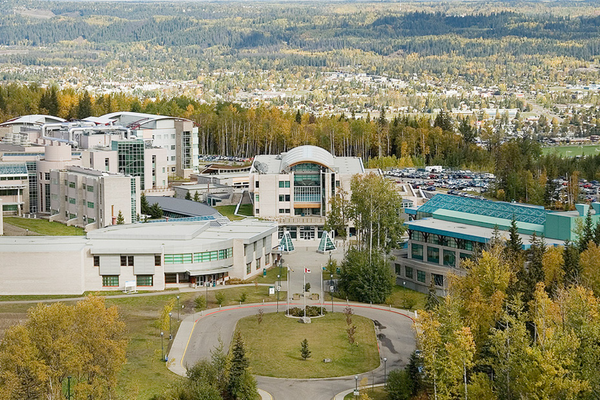
Post Secondary Institutions
Residents have access to several post-secondary education choices. The regional College of New Caledonia (CNC) offers over 75 programs to over 5,000 students. British Columbia Institute of Technology (BCIT) and the Open Learning Agency have integrated their local programs with CNC.
The University of Northern British Columbia (UNBC) campus overlooks the city and offers spectacular views of the Rocky Mountains to the east. It offers a range of undergraduate and graduate programs. UNBC is home to an active international student population from over 40 countries.
Read more about education in Canada:
Schooling in Canada | A Look at the Education System
Higher Education Offers Benefits to Newcomers
Where To Get Medical Care in Prince George, British Columbia
Prince George offers access to high-quality medical care at the University Hospital of Northern B.C. The city’s healthcare services include the B.C. Cancer Agency Centre for the North, family doctors, dentists, walk-in clinics and the full range of health care professionals.
In case of an emergency call 9-1-1. This number is the same no matter where you live in Canada.
Residents have access to two health insurance plans in BC. They are the Medical Service Plan (MSP) and PharmaCare. For those, who can not afford to pay the monthly MSP premium, there is Premium Assistance. You also have the option to purchase individual  .
.
How to Find A Family Doctor
Finding a family doctor is an important step to ensuring you can receive regular medical care in Canada. Check out the list of physicians accepting new patients from the College of Physicians and Surgeons of British Columbia.
If you don’t have a family doctor, you can go to walk-in clinics. Get more information about health care in Canada: Steps to Access Free Health Care in Canada.
What is Day-to-Day Life Like in Prince George?
Things to Do in Prince George
Prince George is a gateway city to Northern British Columbia and an excellent starting point for exploring the region. It offers a unique opportunity to enjoy the amenities of a city and wilderness opportunities just minutes away.
Hiking, camping, fishing, golfing and cross-country skiing are just a few outdoor activities that the city has to offer. Dog-sled racing is an exciting Northern BC experience and has been a popular winter pastime in many northern communities. Other winter sports include skating, curling, downhill skiing, and snowmobiling.
Public Spaces & Attractions
The Prince George Railway Museum, The Exploration Place Museum & Science Centre, and Two Rivers Gallery are popular attractions. You can explore pioneer history and agricultural ways at Huble Homestead for a more rustic experience.
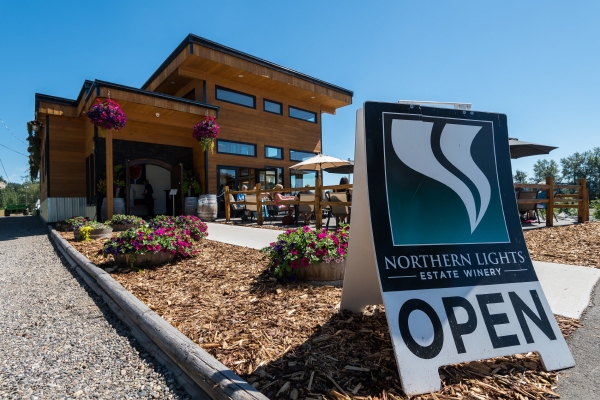
Restaurants & Nightlife
The city has several great places to eat and socialize. You can check out the Northern Lights Estate Winery, CrossRoads Brewing & Distillery, Treasure Cove Casino & Bingo, and Trench Brewing & Distillery.
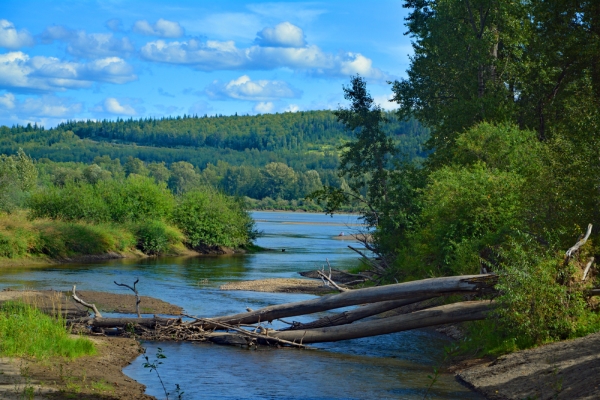
Nature & Natural Landscapes
Fort George Park is Prince George’s main urban park, but there are many other natural landscapes to visit. They include Lheidli T’enneh Memorial Park, Pruden Lake Provincial Park, Teapot Mountain, Connaught Hill Park, and Cottonwood Island Nature Park.
Sporting Events & Concerts
The city is home to the Prince George Cougars of the Western Hockey League. It is also home to several other minor hockey league teams. If you want to see live music or concerts, check out the local listings at CN Centre and Busker Rock Merch and Venue.
Culture & Diversity In Prince George
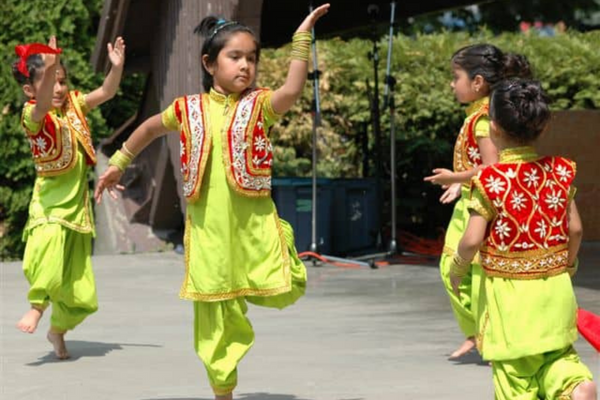
Diversity
Prince George is an increasingly diverse city. About 9% of the population identifies as a visible minority. 3.5% identify as South Asian. Others include Filipino (1.4%), Chinese (1.3%), and Black (1%). Over 15% of the population is Aboriginal.
Over 7,100 people speak a language other than French or English. The largest number of newcomers in recent years are from India, the United Kingdom, the Philippines, the United States, Germany, and China. The city is also home to many cultural associations for immigrants.
Worship
You will find Catholic and Protestant churches, Sikh Temples, and the Prince George Islamic Center.
The Weather in Prince George
Prince George has a humid continental climate and four seasons. You can expect lots of sun between May and September and lots of snow between November and March. The average January temperature is −10 °C, and there’s an average of 38 days from December to February where the high reaches or surpasses freezing.
Summer days are warm, with a July high of 22°C, but lows are often cool, with monthly lows averaging below 10 °C. The transitions between winter and summer, however, are short. There is some precipitation year-round, but February through April is the driest period. Snow averages 216 centimetres each year.
Common Questions Immigrants Ask About Living in Prince George
Is Prince George Part of Vancouver?
No. The city is regarded as the “capital” of northern British Columbia. But it’s about 800 kilometres north of Vancouver. It’s closer to Edmonton, Alberta, which is approximately 740 kilometres west of the city.
Is Prince George a Good City for Immigrants?
The city is seeing an increase in the number of immigrants moving to the city. The region’s economy is growing and offers greater job opportunities. The city is diverse, and offers newcomers the opportunity to live in a beautiful rural part of Canada.
What are the Pros and Cons of Living in Prince George?
This city has much to offer newcomers. It has a lower cost of living and more affordable real estate compared to other mid-size cities in Canada. There is a lot of space with wonderful outdoor experiences all around you. Even though it’s small, there are good career and education options.
A couple of potential drawbacks of the city are job opportunities are limited to certain industries, the city is in a more remote location, and there are fewer amenities compared to bigger cities.
For more information, tools, and free webinars about living in Canada visit our Settling in Canada resource page. We’ll help you to settle successfully!
The west coast of Canada is a popular landing place for new immigrants. Are you thinking about moving to Surrey, British Columbia? Or perhaps another part of Metro Vancouver or B.C.? Moving is a huge life decision. The city you choose will have a significant effect on your future.
Spending time researching cities you could potentially move to is an important step. The city you choose will affect your housing options, job selection, and overall financial well-being.
Surrey is a great destination for newcomers. It is popular with immigrants from Asia-Pacific Region. While mostly suburban, it is a beautiful part of the country with a mild climate and is close to Vancouver. Plus, you are never too far from the water and mountains in B.C. But it is an expensive city compared to other parts of Canada.
If Surrey is at the top of your list, Prepare for Canada can guide you with helpful information.
About Surrey, British Columbia
Living in Surrey, British Columbia allows residents to enjoy beautiful urban forests, clean beaches, golf courses, and great eco-tourism opportunities.
Surrey is the second-largest city by population in British Columbia and is only 23 km from Vancouver Centre. And, housing is more affordable than in Vancouver. So, many people choose to live in Surrey and commute to Vancouver for work if necessary.
Seven main neighbourhoods in Surrey include Cloverdale, Fleetwood, Guildford, Newton, South Surrey, and City Centre encompassed by Whalley.
This city was incorporated in 1879. It was named after Surrey, England because it had land that looked like the region. The Pattullo Bridge was completed in 1937. This allowed the city to expand. Surrey was granted city status in 1993 after significant population growth in the 1980s and 1990s.
How Many People Live in Surrey, British Columbia?
The population as of the 2021 Census is 568,322. This is an increase of 9.7% and over 50,000 residents in five years. And it continues to grow!
How to Find a Job & Build a Career in Surrey
Surrey’s Local Economy
The economy is rooted in agriculture. Today, about one-third of the land is dedicated to farming. Great business opportunities exist for international trade with Asia and the United States. Because of Surrey’s Pacific Rim location, combined with its growing and multicultural population, it’s a strong city for business.
Due to population growth, Surrey became one of the best places in B.C. to invest in real estate. Over the past five years, more than $6 billion of building permits were issued and the Canada Mortgage and Housing Corporation reported a significant increase in the number of housing starts.
The strongest growth industry is health. This is due to the increasing need for medical aid for Surrey’s aging population.
The top industries in this city include:
- Advanced manufacturing
- Supply Chain
- Clean Energy
- Agriculture
- Healthcare
- Education.
Major Employers in Surrey
The health and education sectors are the main sources of employment. Some of the top employers include:
- Surrey School District
- City of Surrey
- SAP
- Microsoft
- Apple
- Lululemon.
Career Pathways in Surrey
You can contact a recruitment agency when you arrive in Canada to help you with your job search. The top recruiters in Vancouver are Recruiting in Motion, iLink Global, Robert Half, and Randstad Canada.
The Surrey Housing Market
Living in Surrey allows you to rent or buy a home near the beach, in urban centres, close to parks, or on quiet farms. The city is made up of these town centres:
Whalley/City Centre
Whalley/City Centre is in North Surrey and is the most densely populated of all the town centers. It is the city and commercial centre of this city, and it is the only town centre serviced by SkyTrain. It links Vancouver, Burnaby, New Westminster, and Surrey. Whalley/City Centre is home to the campus of Simon Fraser University Surrey.
Cloverdale
Cloverdale is the historic centre of Surrey and is known for its heritage sites. Many families with children prefer this location for its parks, playing fields, schools, pools, and recreation centres.
Fleetwood
Fleetwood is one of North Surrey’s quickest developing neighbourhoods. The Fraser Highway, which runs through this town centre, makes Fleetwood ideal for commuters. Also, Fleetwood has beautiful parks, natural areas, trails, and many playgrounds.
Guildford
Guildford is on the northern corner of Surrey. It is famous for the 200-store Guildford Town Centre Mall, one of the largest malls in Canada.
Newton
Newton is the town centre with the largest and most ethnically diverse population. More than half of the population is considered a visible minority, predominantly Sikh. Newton is home to the Kwantlen Polytechnic University campus.
South Surrey
South Surrey is known for its parks, beaches, forests, and recreation facilities. retirees prefer this location. And it has the largest concentration of people over the age of 60.
Is Housing Expensive in Surrey, British Columbia?
Surrey is much more affordable than Vancouver which is why many people move to Surrey and commute to Vancouver to work.
Finding a Place to Rent in Surrey
Renting is a common first step for newcomers to Surrey. The average rent for an apartment is $1,400 for a Bachelor, $1,463 for a 1 Bedroom, $1,770 for a 2 Bedroom, and $2.065 for a 3 Bedroom.
Use Rentals for Newcomers to search for available rental units in Surrey. Here, you can also find current rental prices in Surrey.
When renting a home or apartment, it’s also important to consider buying renter’s insurance to protect your family, belongings, and finances. While renters’ insurance is optional, many property owners may require that you have it as part of your lease agreement.

Buying a Home in Surrey
Buying a home in this city can be expensive. Prices have increased substantially over the past few years. According to data by Zolo, Surrey ranks as the 7th most expensive city in B.C. with an average home price of 1.2 million (as of April 2022). The average cost of a detached house is $2 million. A townhouse is $962, 000 and a condo is $577,000.

Driving & Public Transit in Surrey
Driving in Surrey, British Columbia
It’s common for residents to commute to work in other parts of Metro Vancouver. The city has a grid road system and several highways. Highway 1 is the main route to Vancouver and other cities in the east. Residents can also use Highway 15, Highway 17, Highway 99, and Fraser Highway to get around town.
Driving and parking in all City of Surrey streets are regulated by the Province of British Columbia Motor Vehicle Act. For maps and directions in Surrey, click here. As part of its efforts to increase awareness of high collision areas, the Surrey RCMP supplies traffic safety maps, to show the top collision locations in Surrey.
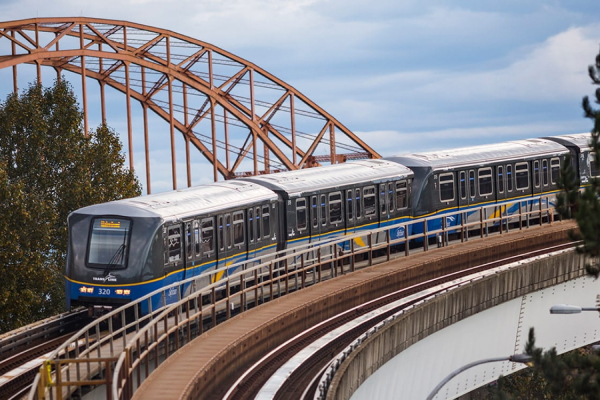
Surrey Public Transit
SkyTrain Expo Line connects Surrey to Vancouver. Buses are the main way of public transport for people living in this city. Currently, there are more than 1,300 bus stops. The fare system is divided into three zones. Passengers pay according to the number of zones they travel in. However, passengers pay one fare no matter how many zones they cross after 6:30 pm on Monday to Friday, and weekends and holidays.
You must have exact change when getting on a bus because the driver does not accept bills or give change. Make sure you receive Proof of Payment/Transfers. Transfers are valid for 90 minutes. If you travel often, you can buy a monthly fare Compass Card.
Get more information about driving in Canada:
Driving Test in Canada: A Full Guide
Tips for Winter Driving to Ensure Your Safety
Community Support for Newcomers
Surrey supports newcomers through several immigrant support agencies:
- DIVERSEcity Community Resources Society
- MOSAIC
- Options Community Services Society
- Pacific Community Resources Society
- Progressive Intercultural Community Services (PICS)
- Sources Community Resources Society
- S.U.C.C.E.S.S.
- Surrey Libraries.
Newcomers to British Columbia may also be eligible for the Introduction to British Columbia program through the Immigrant Services Association of British Columbia.
Language Support in Surrey
Newcomers can receive language support and take classes through community settlement agencies such as the Fraser Health Authority, DIVERSEcity Community Resources Society, and Options Community Services Society.
Personal Finance & Banking
Getting your finances in order once you arrive in Canada is an important step you cannot overlook. You can open a bank account at any local bank or credit union. Most banks offer special programs for immigrants to open a bank account, get a credit card, or line of credit, and even qualify for a mortgage.
Get more banking tips for newcomers:
How Much Money Will I Need to Move to Canada?
Top 10 Financial Steps to Take Before You Leave for Canada
Move to Canada | Transferring Cash & Valuables
Open a Bank Account Before Arriving in Canada
Surrey’s Education System
Elementary and High School Education
In British Columbia, parents can choose to send their children to public schools, independent schools, or homeschooling. And because public schools are government-funded, many people choose to send their children to public schools.
Surrey School District has the largest student enrollment in British Columbia with:
- Over 100 elementary schools
- 28 secondary schools
- Five learning centres
- Three adult education centres
- A distributed online learning program, and
- A variety of satellite and inter-agency programs.
For a list of public schools click here. Independent schools offer specific religious, cultural, educational, or philosophical approaches. For information about independent schools click here.
If you choose to teach your children at home, you must register them with the Ministry of Education. You will also have to follow the curriculum guidelines that the ministry sets.
Post Secondary Institutions
Surrey is home to a third campus for Simon Fraser University (SFU). On this SFU campus, students can enroll in the following programs:
- Applied sciences
- Arts and social sciences
- Communication
- Business administration
- Technology
- Education
- Mathematics, and
- Science.

Kwantlen Polytechnic University has a Surrey campus that offers science, business, art, and health programs.
There are also several private post-secondary colleges such as Brighton College, Sprott Shaw College, CDI College, Western Community College, Sterling College, Stenberg College, Academy of Learning, Surrey Community College, Discovery Community College, and Vancouver Career College.
Read more about education in Canada:
Schooling in Canada | A Look at the Education System
Higher Education Offers Benefits to Newcomers
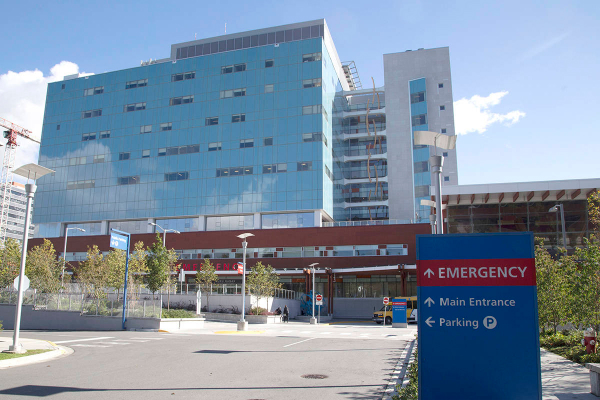
Where To Get Medical Care in Surrey, British Columbia
In British Columbia, there are two main health insurance plans: the Medical Service Plan (MSP) and PharmaCare. For those, who can not afford to pay the monthly MSP premium, there is Premium Assistance.
Three main hospitals serve Surrey residents: Surrey Memorial Hospital, Jim Pattison Outpatient Care and Surgery Centre, and Peace Arch Hospital. In case of an emergency call 9-1-1. This number is the same no matter where you live in Canada. For prescription drugs and some services that British Columbia Health does not cover, you can pay for additional health insurance plans.
How to Find A Family Doctor In Surrey
Once you get medical insurance coverage, you should find a family doctor. You can refer to the College of Physicians and Surgeons of British Columbia for a list of physicians accepting new patients. If you require specialized care, your family doctor will refer you to specialists.
But, if you are unable to find a family doctor, you can go to walk-in clinics until you secure your doctor. Get more information about health care in Canada: Steps to Access Free Health Care in Canada
What is Day-to-Day Life Like in Surrey?
Things to Do in Surrey
Surrey is an outdoor lover’s paradise. It is often called the City of Parks because of its 600 parks and 277 trails and walkways. Living in this city provides opportunities for hiking, biking, bird watching, and outdoor sports. For more information on Surrey Parks click here. Surrey also boasts some of Metro Vancouver’s best golf courses for all skill levels.
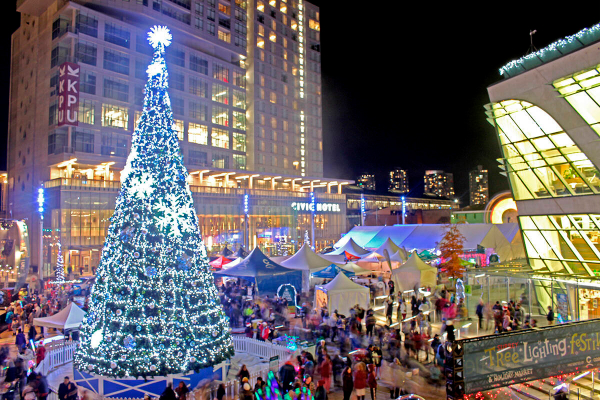
Public Spaces & Attractions
Surrey hosts five annual city events. They are Tree Lighting Festival, Party for the Planet, Surrey Children’s Festival, Surrey Fusion Festival, and Surrey Canada Day, Western Canada’s biggest Canada Day celebration. Every year tens of thousands of people attend the Cloverdale Rodeo and Country Fair. And, this makes it the second-largest rodeo in Canada after the Calgary Stampede.
Every year on April 13, the Sikh community celebrates Vaisakhi, the largest parade outside of India.
Restaurants & Nightlife
This city is known as a great place to wine and dine. There are numerous local wineries in the area and many great restaurants with an international flavour. Be sure to try the iconic Old Surrey Restaurant. Other places to check out include Tap Restaurant, Afghan Kitchen, Vault Restaurant, and New York New York Greek Restaurant.
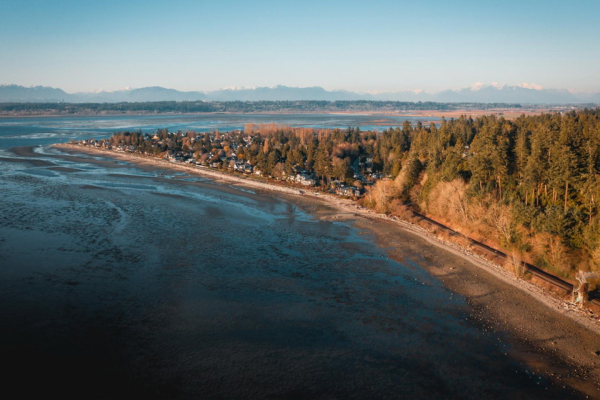
Nature & Natural Landscapes
With over 600 parks and endless green space, it’s easy to get lost in all the surrounding nature. Some points of interest to check out include Crescent Beach, Surrey Bend Regional Park, Darts Hill Garden, and Historic Stewart Farm.
Sporting Events & Concerts
This city is not home to any professional sports teams. But it is host to the Canada Cup International Women’s Fastpitch Tournament. Cricket is a popular sport in the city. If you want to take in a concert, check out The Roxy, River Rock Casino Resort, Centennial Theatre, and The Cobalt.
Culture & Diversity In Surrey
Diversity
It is a truly diverse community. 57.8% of the population identifies as a visible minority. This is about 300,000 residents. The biggest minority community is South Asian with 32.4% of the population. This is followed by Chinese (7.7%), Filipino (6.2%), and Southeast Asian (2.5%). 2.6% of residents are Aboriginal. With a large South Asian population, Surrey hosts the Diwali festival in British Columbia.
Worship
Christianity is the predominant religion in Surrey. 38.2% of the population identifies as Christian – Protestant, Catholic, Orthodox, or other Christians.
The second-largest religious group, 22.6%, is the Sikh. Every year on April 13, the Sikh community organizes a big celebration of Vaisakhi. And this celebration often includes a Nagar Kirtan (parade). Surrey’s Guru Nana Sikh Gurdwara is one of the leading Sikh Temples in Canada.
The Weather in Surrey
There is a moderate, inter-coastal Pacific-Northwest climate that is appealing and comfortable. Winter in Surrey is mild with an average temperature of 5 degrees C. It rarely snows. However, getting many rainy and gloomy days or even rainy weeks in a row is not uncommon.
Spring is also wet. Summer is sunny with an average temperature of 22 degrees C, and autumn is cool. Surrey enjoys about 1848.3 hours of sunshine per year (an average of 5 hours per day).
Common Questions Immigrants Ask About Living in Surrey
Is Surrey a good place for immigrants?
Living in Surrey provides many great services and activities for families making it a great choice for newcomers. It’s close to Vancouver with affordable housing, many schools, and a diverse community.
What are the benefits of living in Surrey?
Surrey is a popular destination for Asian immigrants. The city has more affordable housing compared to Metro Vancouver. It has a great hospital system and access to nature. It’s a growing city that offers a great community for families.
What are some potential disadvantages of living in Surrey for new immigrants?
Surrey is expensive compared to other large cities in Canada. Most people commute, so you’ll likely have to drive out of the community to work each day. Traffic can be an issue.
If you are thinking about moving to Canada, British Columbia is an appealing province to consider. There are many great cities to research, including Delta, B.C. Where you live in Canada will have a big impact on your lifestyle for years to come. So, before you decide where to live, carefully assess possible landing locations. You’ll want to look at the cost of living, job market, local economy, and the overall lifestyle of the locals.
Delta is a great city to consider if you plan to move to British Columbia. It’s a part of Greater Vancouver and is only 22 kilometres from the United States border. Mostly a rural area surrounded by water on three sides, it’s an ideal location for people who love the outdoors.
Learn more about life in Delta, British Columbia.
About Delta, British Columbia
Delta is the largest municipality in the Greater Vancouver Regional District. Located at the delta of the Fraser River and having rich soils and water, Delta is one of the most important agricultural areas in Metro Vancouver.
Just 27 km from Vancouver, Delta is home to many people who prefer to live and raise their families in safe, quiet neighbourhoods, surrounded by nature, and, if necessary, commute every day to other cities to work. Delta is ideal for nature lovers with its parks, bike and walking trails, islands, and wildlife.
Discovered by European settlers, Delta’s roots date back to 1791. It was an isolated community until ferry service and Highway access were established in 1962. It wasn’t until 2017 that the city’s name was changed from the Corporation of Delta to the City of Delta.
Delta comprises three different neighbourhoods: North Delta, Ladner, and Tsawwassen. North Delta is the most populous of the three communities. Most of its residents are middle-class people who commute daily to Vancouver or to other places to work.
Ladner is a community proud of preserving the atmosphere of a 19th-century fishing village. Many of its residents are involved in farming and fishing.
Tsawwassen is a rich community with beautiful houses. It is also home to the Tsawwassen Indian Reserve.
How Many People Live in Delta, British Columbia?
According to 2021 census data, Delta has a population of 108,455 residents. This is a 6.1% growth in population since 2016. The city is the 10th largest population in British Columbia.
How to Find a Job & Build a Career in Delta
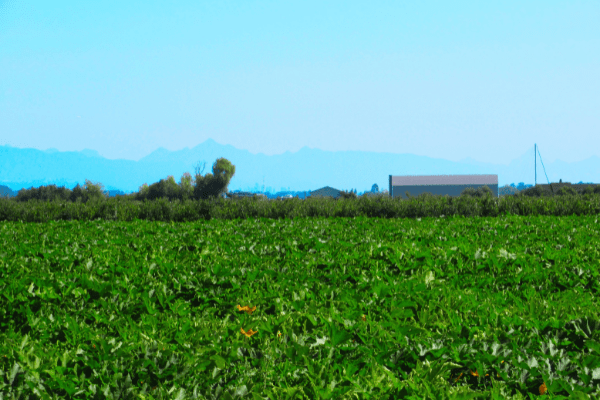
Delta’s Local Economy
Because of its fertile soil Delta is one of the most important agricultural areas in Metro Vancouver. The regulations of the Agricultural Land Reserve prevent Delta’s land from being converted to suburban housing. One of Delta’s communities, Ladner, is traditionally a farming and fishing village.
Nevertheless, North Delta, located northeast of Delta, is a suburban area with more than 51,623 residents. It is largely a middle-class bedroom community, which means that most of the workforce have homes in Delta but commute daily to work in the nearby cities.
Tsawwassen is the shooting location for many films. Some productions that used Tsawwassen sights were The X-files, Jumanji, Smallville, Insomnia, and X-men: The Last Stand.
The top industries in Delta are:
- Agriculture
- Manufacturing
- Transportation
- Construction
- Retail
- Film.
Major Employers in Delta
Most top employers are in manufacturing, farming, or agriculture. Top employers include:
- Amazon
- GCT Global Container Terminals Inc.
- TDK Logistics Inc.
- British Columbia Ferry Corp.
- BC Fresh Vegetables Inc.
- Canadian Autoparts Toyota Inc.
- Ocean Trailer.
Career Pathways in Delta
One of the advantages of living in Delta is you can work in the local economy or commute to other regions within the Greater Vancouver area. You have plenty of job opportunities available. To search for potential job opportunities you can use bcjobs.ca and WorkBC. You can also work with local recruitment agencies such as Recruiting in Motion, Impact Recruiting, Robert Half, and Randstad Canada.
The Delta Housing Market
North Delta is the largest residential area and home to more than half of the municipality’s population. Affordable housing attracts many immigrants and Canadians, who choose to live in this neighbourhood and commute to work in other locations in Metro Vancouver.
Ladner together with Tsawwassen is called South Delta. Ladner is a historic fishing village. Many of the buildings reflect an earlier era. Ladner’s real estate market consists of ranch-style houses, duplexes, waterfront townhouses, riverfront condos, and floating homes.
Is Housing Expensive in Delta, British Columbia?
The cost of living is higher than the national average. It is one of the more expensive cities in the country to rent or buy real estate. However, it does offer more affordable housing prices than Metro Vancouver.

Finding a Place to Rent in Delta
Rental rates are comparable to Vancouver. You will find it challenging to find a place to rent for less than $2,000 per month. The average rent for an apartment in Vancouver is $2048 for a Bachelor, $2211 for a 1 Bedroom, $3421 for a 2 Bedroom, and $4973 for a 3 Bedroom. These rates are significantly higher compared to other smaller cities in the country.
You can also check out our Rentals for Newcomers site. This practical and easy-to-navigate site will help you find housing and make an easier transition to life in Canada. Here you can find helpful articles about housing in Canada and average rental prices in cities across Canada. It’s helpful to check out the prices on the site since rental prices change all the time.
When renting a home or apartment, it’s also important to consider buying renter’s insurance While renters’ insurance is optional, many landlords may insist that you have it.
Buying a Home in Delta
Delta housing prices are lumped in with the overall costs to buy a house in the Greater Vancouver area. Housing affordability is a big concern in the city.
According to Royal LePage, the average cost to buy a home in Greater Vancouver (including Delta) is $1,253,300. This is a year-over-year increase of 17.1%. The median price for a single-family detached home is $1,707,900. The median price to buy a condo is $717,200.
Find out more about buying your first home in Canada: First Time Home Buyer: Newcomer Tips
Driving & Public Transit in Delta
Driving in Delta, British Columbia
There are a series of major highways that pass through the city. It is a major transportation hub for the Lower Mainland. Most cars leaving Vancouver to go to the United States pass through. It is also a popular route for people travelling to Vancouver Island using the Tsawwassen ferry terminal.
Major highway routes include:
- Highway 99 links Delta to Richmond via the George Massey Tunnel.
- Alex Fraser Bridge and Highway 91 link North Delta to New Westminster and Richmond.
- Highway 10 links Delta to Surrey, Langley, and all points eastward.
- Highway 17 has Lower Mainland and Vancouver Island sections joined by the Tsawwassen B.C. Ferry Terminal.
All drivers must have a valid British Columbia driver’s licence. Learn more about getting your driver’s licence in B.C.
Get more information about driving in Canada:
Driving in Canada: 10 Essential Facts to Know
Driving Test in Canada: A Full Guide
Tips for Winter Driving to Ensure Your Safety
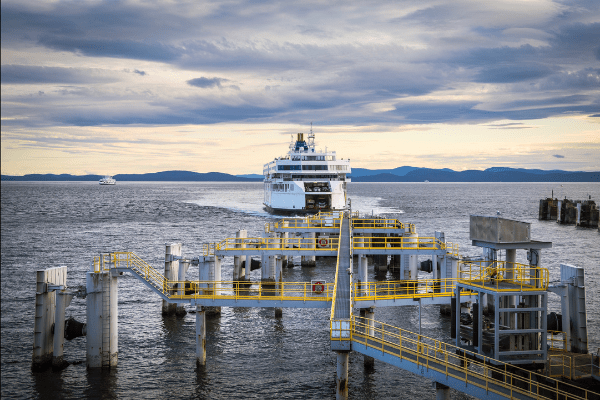
Delta Public Transit
A network of buses and community shuttles connect Delta to other communities. Translink, The Greater Vancouver Transit Authority, manages bus routes and schedules in Delta.
Translink covers three fare zones and Delta is in the Green Zone. Fare prices depend on the number of zone boundaries a passenger crosses during a trip. Transit Fare holders can make unlimited transfers within 90 minutes throughout the number of zones printed on their tickets. Passengers who pay on the bus must have the exact coin fare. Frequent travellers save money by using Prepaid Fare Media. On weekdays after 6:30 pm and on weekends and holidays commuters travel everywhere on a one-zone fare.
Children under the age of four ride for free. Concession fares apply to children aged 5-13, high-school students, and seniors aged 65+.
Community Support for Newcomers
Newcomers to British Columbia may also be eligible for the Introduction to British Columbia program through the Immigrant Services Association of British Columbia. Other organizations based out of Vancouver include SUCCESS BC Settlement & Integration, Immigration Services Society of BC, Settlement Orientation Service, and MOSAIC.
Find out more about Services in Canada to Help Newcomers Settle.
Language Support in Delta
The Language Instruction for Newcomers to Canada (LINC) Program provides courses for permanent residents. Delta Community College offers instructional courses. You can also get help through the Surrey Language Assessment Centre.
Personal Finance & Banking
Setting up a personal bank account is an important step for newcomers. All local banks and credit unions offer programs for new immigrants. These programs can help you open a bank account, get a credit card, line of credit, and even qualify for a mortgage.
Get more banking tips for newcomers:
Top 10 Financial Steps to Take Before You Leave for Canada
Move to Canada | Transferring Cash & Valuables
Open a Bank Account Before Arriving in Canada
Delta’s Education System
Elementary and High School Education
Delta School District has 24 elementary and seven secondary schools, with nearly 16,000 students. It also maintains the Delview Adult Centre and the Delta Resource Centre.
Parents seeking an alternative to traditional classroom-based instruction can choose Home Quest, a Ministry-funded Distributed Learning program.
Delta School District offers French Immersion programs which provide students with the opportunity to become bilingual. The District also works with Canadian Parents for the French–Delta Chapter to promote French in the community. Canadian Parents for French organizes language camps and offers scholarships. Adults and children can also enroll in French courses at L’Alliance Française in Delta.
Post Secondary Institutions
Delta Community College is the only post-secondary school in the city. However, there are several major universities and colleges close by in Vancouver.
Read more about education in Canada:
Schooling in Canada | A Look at the Education System
Higher Education Offers Benefits to Newcomers
Where to Get Medical Care in Delta, British Columbia
British Columbia has a government-funded health insurance plan called the Medical Services Plan (MSP). You need to be a permanent resident in Canada to qualify. MSP pays for health costs such as visits to the doctor, most medical tests, and treatments. For information on medical insurance in British Columbia click here.
Delta Hospital, located in Ladner provides 24-hour emergency, out-patient, and in-patient care to citizens of North Delta, Ladner, and Tsawwassen. It offers surgical daycare, radiography, ultrasound, mammography, cardiac services, outpatient laboratory services, and other services.
North Delta Public Health Unit and South Delta Public Health Unit provide an annual influenza program, early childhood development services, hearing clinic services, vision and hearing screening, tuberculosis testing, parenting education and support, and dental care.
In case of an emergency call 9-1-1. This number is the same no matter where you live in Canada. For prescription drugs and some services that British Columbia Health does not cover, you can pay for additional health insurance plans. Some people have third-party health insurance through their employer benefits packages.
How to Find A Family Doctor in Delta
Every new resident of Delta should find a family physician. On its website, the College of Physicians and Surgeons of British Columbia provides a list of physicians accepting new patients. If necessary, family physicians refer their patients to specialists and hospitals. Patients who have not found family doctors can go to walk-in clinics.
Get more information about health care in Canada: Steps to Access Free Health Care in Canada
What is Day-to-Day Life Like in Delta?
Things to Do in Delta
Delta has many beautiful parks and scenic trails for walking, hiking, biking, in-line skating, and horseback riding. Bird watching is a popular activity in Delta and attracts tourists from around the world. As Delta is found on the Pacific Flyway, more than five million migratory birds stop in the area every year. The most famous place for watching birds is Boundary Bay.
The shallow waters and sandy bottoms of Boundary Bay also attract windsurfers, skim, kite, and paddle boarders.
Farmlands in Delta offer many U-pick fields. The Earthwise Farm and the Earthwise Gardens are learning centres for gardening and growing produce. One of the biggest recreational centres in Delta is the Ladner Leisure Centre. It offers swimming pools, swirl, an aquatic climbing wall an inflatable obstacle course, a sauna, a weight room, a fitness studio, and an ice arena.
Public Spaces & Attractions
There are many local attractions to explore. Many are outdoors such as Emma Lea Farms, Westham Island Herb Farm, Ladner Village Market, North Delta Farmers’ Market, and Angel Estate Winery. If you enjoy art, visit Tsawwassen Arts Centre.
Restaurants & Nightlife
There are a variety of great restaurants and pubs throughout Delta. Some of the most popular include Primerose Greek Restaurant, Tasty Indian Bistro, and Taverna Gorgona.
Nature & Natural Landscapes
There is no shortage of natural landscapes to explore in Delta. Check out Centennial Beach, Boundary Bay Regional Park, and Brunswick Point Park.
Sporting Events & Concerts
Delta is not home to any major or minor league sports team. However, Vancouver is only a short drive away. If you want to enjoy live music or concerts, there are several intimate venues to visit. They include Blue Frog Studios, Centennial Theatre, and Commodore Ballroom.
Culture & Diversity In Delta
Diversity
Delta has a diverse population. Over one-third of the population are a visible minority. This accounts for about 36,000 of the 108,000 residents. The largest minority group is South Asian with 20.3% of the population. Other minority groups include Chinese (7.6%), Filipino (2.6%) and Japanese (1.1%). 3.4% of the population is Aboriginal.
Worship
Delta also has a diverse religious community. About 44% identify as Christian, 10.6% Sikh, 3.1% Hindu, and 2.1% Islam. Muslims in Delta can refer to the Surrey/Delta Branch of the BC Muslim Association.
Sikhs in Delta can visit Guru Nana Sikh Gurdwara in Surrey. It is one of the leading Sikh Temples in Canada.
The Weather in Delta
Delta enjoys one of the mildest climates in Canada. Winter is not as cold as in other cities in the country and there is little snow. The daily average temperature in January is 2.8° C. Extremes are rare.
Summer in Delta is sunny and warm but seldom hot. In July and August, the average temperature is 16.9° C. Unlike many Canadian cities where summer replaces winter in a matter of few weeks, even days, Delta has genuine fresh spring. Autumn is cool and pleasant.
Common Questions Immigrants Ask About Living in Delta
Is Delta a Good Place for Immigrants?
Delta is a thriving multicultural community with people from all over the world. It is a great location for newcomers because it has well-established cultural communities and support for immigrants.
What are the Benefits of Living in Delta?
Delta is a beautiful city to live in. It is surrounded by nature and water, and it is only a short drive from Vancouver. The city has a mild climate and there are a lot of career opportunities for newcomers to pursue.
What are the Disadvantages of Living in Delta?
The major drawback of living in Delta is the high cost of living. There are also limited entertainment options compared to large cities. Jobs in the local community are not plentiful, but there are significant opportunities close by in other communities in Greater Vancouver.
Are you thinking about moving to Vancouver? What about other areas in British Columbia or across Canada? Moving to a new country is an exciting time. And it’s a time when you will need to make important decisions. For many new immigrants, Vancouver is the right city. It is Canada’s largest city on the west coast.
It’s wise for newcomers to research cities in Canada before choosing a new place to call home. Does the job market offer opportunities? Are there housing options that fit your budget? How expensive is the cost of living? These questions will help you make the best decision based on your lifestyle needs.
The City of Vancouver is one of the top destinations for newcomers to Canada, particularly from the Asia-Pacific Region. That’s not surprising as it’s one of the most beautiful, livable cities in Canada and the world. It offers a mild climate, cultural diversity, and impressive natural setting, all found in a growing metropolitan city.
Vancouver is one of the most expensive cities in the country, it is also the most liveable city. It has plans to become the greenest city in the world through its Vancouverism urban planning design philosophy. There are many reasons why it’s an attractive city for new immigrants. Prepare for Canada can guide you with helpful information about living in Vancouver.
About Vancouver, British Columbia
Vancouver is a large urban city found in Western Canada. It is part of the Lower Mainland area of British Columbia. The city has the third-highest quality of living in the world. It is one of the most diverse cities in Canada. This helps it to attract new residents, tourists, and economic investors.
The city was founded on First Nations territory, and it was built by immigrants from countries around the world. The Fraser Gold Rush in 1858 first drew significant interest in the region. Thousands of people migrated to the area from the United States and New Westminster. The first European settlers made their way to Vancouver in 1862. The City of Vancouver was incorporated in 1886, the same year the transcontinental train made its way to the west. The city is named after Royal Navy Captain George Vancouver.
Vancouver is an international city surrounded by mountains, lush forests, Vancouver Island, and the fourth-largest port in the Americas. It is an outdoor lovers’ paradise and a gateway to adventure.
How Many People Live in Vancouver, British Columbia?
The City of Vancouver has a population of 631,486 (Canada Census: 2016). The larger region, known as Metro Vancouver, has 2,643,431 people. It is the 8th most populated city and the third-largest metropolitan area in Canada. The city has the highest population density in Canada. There are over 5,400 people per square kilometre.
Thirteen of the province’s 30 most populous municipalities are in Metro Vancouver. They include the City of Vancouver, North Vancouver, West Vancouver, Burnaby, Richmond, Surrey, and White Rock.

How to Find a Job & Build a Career in Vancouver
Vancouver’s Local Economy
Vancouver has a dynamic, highly diversified urban economy with growing knowledge-based sectors and strong global linkages. The city is one of Canada’s largest industrial centres thanks to its location on the Pacific Rim and at the western terminus of Canada’s transcontinental highway and rail routes.
Forestry and mining companies have their headquarters in this city. As well, in recent years, the city has become an increasingly important centre for:
- Technology
- Software engineer
- Biotechnology
- Digital entertainment and interactive media
- Green economy
- Video game development
- Film.
Vancouver is known as “Hollywood North” because of its growing film industry and filming locations.
Major Employers in Vancouver
Vancouver is home to many large corporations, a strong mining industry, technology, film, and healthcare industries. Small businesses are considered the engine of the provincial economy.
Some of the top companies in this city are:
- Amazon
- Microsoft
- SAP
- Apple
- IBM
- University of British Columbia
- RBC
- Telus
- Electronic Arts
- Intel Corporation.
Career Pathways in Vancouver
To search for potential job opportunities you can use bcjobs.ca and WorkBC. Working with a recruitment agency is an effective way for newcomers to find work. The top recruiters in Vancouver are Recruiting in Motion, Impact Recruiting, Robert Half, and Randstad Canada.
The Vancouver Housing Market
Where you choose to live will have a big impact on your budget. When considering a neighbourhood, look at the amenities in the area, for example, how close are schools, child care, the grocery store, and medical care? How long will the commute take? Is public transit easily accessible? Consider the real estate cost and the value a neighbourhood offers your family.
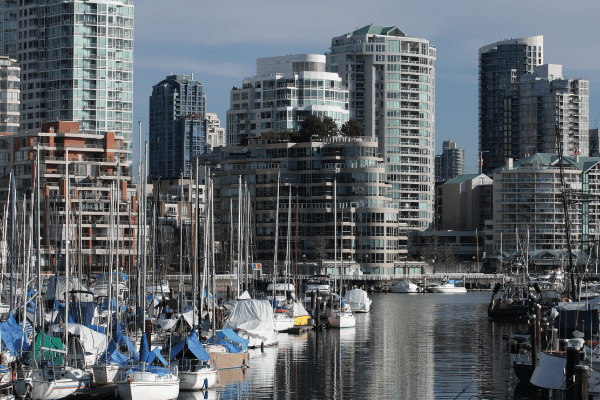
Is Housing Expensive in Vancouver, British Columbia?
Vancouver is one of the most expensive cities in North America. It is the second most expensive city to buy and rent in Canada. Only Toronto is more expensive. And costs keep going up.
While newcomers are attracted to the downtown lifestyle, it comes with high costs. With more affordable housing within the Vancouver metropolitan area, you may want to consider living outside of the city.
Finding a Place to Rent in Vancouver
Vancouver has the most expensive rental rates in Canada. You will find it challenging to find a place to rent for less than $2,000 per month. The average rent for an apartment in Vancouver is $2048 for a Bachelor, $2211 for a 1 Bedroom, $3421 for a 2 Bedroom, and $4973 for a 3 Bedroom. These rates are significantly higher compared to other smaller cities in the country.
Use Rentals for Newcomers to search for available rental units in Vancouver. Here, you can also find current rental prices in Vancouver, which is helpful since rental prices can change often.
You’ll need renter’s insurance to protect your belongings. Most property owners will require you to have this insurance.

Buying a Home in Vancouver
Finding a home in the Vancouver area can be challenging, especially the closer you get to Vancouver proper. Housing affordability is a huge concern in the region, with many people choosing to live in homes in suburban cities like Coquitlam, Surrey, and Richmond, and commuting to Vancouver for work if necessary.
But, over the last decade, people have been moving even further east as housing prices continue to rise. Or, they are choosing smaller, multi-family dwellings instead of single-detached homes. While newcomers commonly want to live downtown for convenience and lifestyle, home purchase prices are higher. The further east you go, the lower the prices.
According to Royal LePage, the average cost to buy a home in Vancouver is $1,253,300. This is a year-over-year increase of 17.1%. The median price for a single-family detached home is $1,707,900. The median price to buy a condo is $717,200. To buy a home, contact a realtor in the area, who will guide you through the home-buying process. Find out more about buying your first home in Canada: First Time Home Buyer: Newcomer Tips
Driving & Public Transit in Vancouver
Driving in Vancouver, British Columbia
Highway driving is common, but the city has some of the worst traffic congestion in the country. Metro Vancouver’s network of highways is key to connecting communities. Here are the major highways:
- Highway 1 (also known as the TransCanada Highway): runs from the west coast of B.C. through all the communities in Metro Vancouver and beyond to the rest of Canada
- Lougheed Highway (also known as Highway 7) runs from Burnaby to beyond Mission on the north side of the Fraser River
- Highway 91/91A is also known as the Richmond Connector
- Highway 99 (Sea to Sky) is the main route to Whistler.
If you plan to drive, learn about Getting Your Driving License in Vancouver, BC.
Get more information about driving in Canada:
Driving in Canada: 10 Essential Facts to Know
Driving Test in Canada: A Full Guide
Tips for Winter Driving to Ensure Your Safety
Vancouver Public Transit
TransLink runs Vancouver’s public transit system. The extensive transit system connects the City of Vancouver and the surrounding cities and towns in the metropolitan area. The various forms of transit include:
- Buses
- SkyTrain (which connects Vancouver to Surrey and Coquitlam)
- West Coast Express train, a commuter train that runs from Vancouver to Mission (about 70 kilometres from Vancouver)
- SeaBus (hovercraft boats that connect Vancouver to North Vancouver).
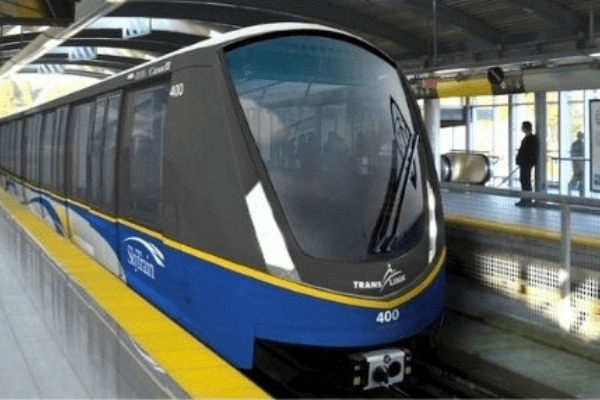
For more details, check out Public Transit in Vancouver | How to Get Around with Ease.
The second busiest airport in Canada is the Vancouver International Airport (YVR) located just 12 km from downtown and accessible by public transit.
Community Support for Newcomers
There are settlement agencies in Vancouver to help new immigrants settle into their new city and country. The main organizations to consider include SUCCESS BC Settlement & Integration, Immigration Services Society of BC, Settlement Orientation Service, and MOSAIC.
Language Support in Vancouver
There are over 190 languages spoken throughout the city, with Chinese being the most widely spoken language outside of English. Residents can get language support through settlement organizations, the Vancouver Public Library, and other community organizations. If you require, you can also get help using language service providers such as CanTalk and LingoStar.
Personal Finance & Banking
An important first step is to set up a personal bank account as soon as you arrive. All local banks have programs to help newcomers open a bank account and get a credit card. You can visit a local bank branch to open a bank account and learn about financial products such as a line of credit or mortgage.
Top 10 Financial Steps to Take Before You Leave for Canada
Move to Canada | Transferring Cash & Valuables
Open a Bank Account Before Arriving in Canada
Vancouver’s Education System
Vancouver has a strong education system from elementary to college and university. It has many learning options for kids, including public, Catholic, and private schools in addition to many childcare and daycare options. It has world-class post-secondary institutions for those enrolling in higher education.
Elementary and High School Education
Vancouver has many elementary and high schools for your child’s education. The Vancouver School Board administers about 76 elementary schools, 17 elementary annexes, 18 secondary schools, 7 adult education centres, and 2 Vancouver Learn Network schools. This includes 18 French Immersion schools and a Mandarin bilingual school.
Post Secondary Institutions
Home to the world-class University of British Columbia (UBC), nationally-renowned Simon Fraser University (SFU), and a wide range of top-notch professional colleges, Metro Vancouver is one of the best places in Canada to pursue higher education.
UBC consistently ranks among the 40 best universities in the world and is among the 20 best public universities. The other public universities are Capilano University, Emily Carr University of Art and Design, and Kwantlen Polytechnic University.
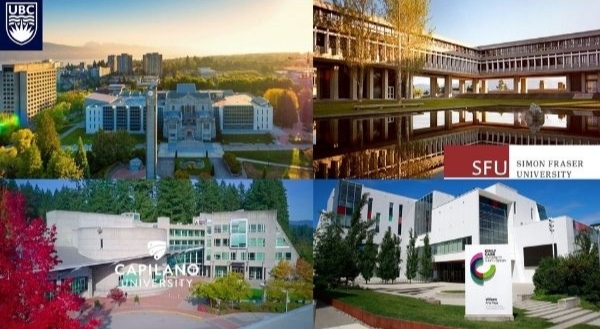
There are five private institutions in the region: Trinity Western University in Langley, University Canada West, NYIT Canada, Fairleigh Dickinson University, and Columbia College.
Vancouver Community College and Langara College are publicly funded college-level schools. They are augmented by private institutions and other colleges in the surrounding areas and offer career, trade, and university-transfer programs.
Read more about education in Canada:
Schooling in Canada | A Look at the Education System
Higher Education Offers Benefits to Newcomers
Where To Get Medical Care in Vancouver, British Columbia
Vancouver Coastal Health offers medical care across its 13 hospitals. The biggest hospitals in the network include Vancouver General Hospital, Mount Saint Joseph Hospital, and St. Paul’s Hospital.
In case of an emergency call 9-1-1. This number is the same no matter where you live in Canada.
British Columbia has a government-funded health insurance plan called the Medical Services Plan (MSP). It is only for British Columbia residents who are Canadian citizens, landed immigrants, or government-assisted refugees. You can get MSP if you’re an international student with a study permit, or if you have a work permit for six months or longer.
MSP pays for health costs such as visits to the doctor, most medical tests, and treatments. But, there are some health costs that are not covered including dentists and physiotherapists. For prescription drugs and services that MSP does not cover, you can pay for added health insurance plans. Third-party health insurance is offered through some employer benefit plans.
How to Find A Family Doctor In Vancouver
Finding a family doctor when you move to a new city is important. Contact HealthLink BC by calling 8-1-1 to speak with a health service navigator. They will provide you with information about finding a family doctor in your community. You may be put on a waiting list. Visit a local walk-in clinic for non-emergency care if you do not have a doctor.
Learn more about health care in Canada: Steps to Access Free Health Care in Canada
What is Day-to-Day Life Like in Vancouver?
Things to Do in Vancouver
Metro Vancouver is a popular destination for outdoor recreation, thanks to its mild climate and proximity to the ocean, mountains, rivers and lakes. So you’ll find world-class parks, including the 404 hectares of prime downtown land that forms Stanley Park, and smaller parks that host recreational facilities, community centres, and special amenities such as off-leash dog areas and skate parks. Vancouver has close to 300 city-run parks, beaches, and gardens.
Within a 20-to-30-minute drive from downtown Vancouver are the North Shore Mountains, with three ski areas: Cypress Mountain, Grouse Mountain, and Mount Seymour. Mountain bikers have created world-renowned trails across the North Shore. And, the Capilano River, Lynn Creek, and Seymour River, also on the North Shore, provide opportunities to white water enthusiasts. For more information on recreational activities in Vancouver, click here.
Public Spaces & Attractions
Vancouver is the perfect combination of big-city living with countless outdoor adventures. There is always something to do and events going on. Some of the most popular attractions with residents and tourists include Canada Place, Granville Island, the Brockton Point Totem Poles, Chinatown, Science World, and the Museum of Anthropology. If you enjoy film and music, you can attend the Vancouver International Film Festival, Vancouver Folk Music Festival, or the Vancouver International Jazz Festival.
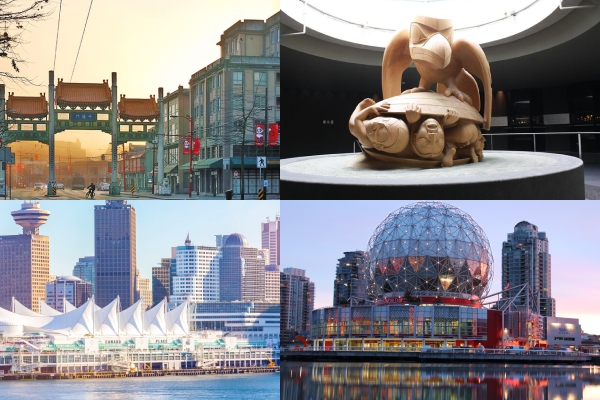
Restaurants & Nightlife
Vancouver has no shortage of world-class restaurants and nightlife. If you are into the theatre, check out what is playing at Arts Club Theatre Company on Granville Island, and Bard on the Beach. If you like to dance or have a drink with friends, Granville Entertainment District has the city’s highest concentration of bars and nightclubs. Gastown and Davie Village are great locations for upscale restaurants and international cuisine.
Nature & Natural Landscapes
Vancouver is known for its mountain ranges and unique natural landscapes that offer many activities. While there are too many to mention some activities include whale watching, skiing at Whistle Mountain, walking across the Capilano Suspension Bridge, or the Stanley Park seawall, the world’s longest waterfront path.
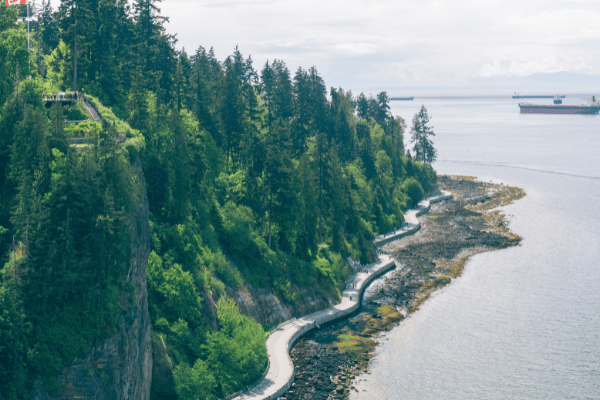
Sporting Events & Concerts
Vancouver is a sports town. It was host to the 2010 Winter Olympics and Paralympics. The city is home to the Vancouver Canucks hockey team, BC Lions football team, the Vancouver Whitecaps soccer team, and the Vancouver Giants of the Western Hockey League.
There are plenty of concert venues across the city and it’s common to find live music and concerts at Rogers Arena, Queen Elizabeth Theatre, BC Place Stadium, and Pacific Coliseum. If you are looking for something more intimate, check out Commodore Ballroom, Orpheum Theatre, or the Vogue Theatre.
Culture & Diversity In Vancouver
Diversity
Vancouver is one of the most ethnically diverse cities in Canada. About 42% of the city’s population are immigrants. This is over 260,000 people. In recent years, about 40,000 new immigrants move to the city each year.
52% of the population are not native English speakers. 16% speak Chinese as their primary language at home. Just over 50% of residents are a visible minority. 27% of the population is Chinese. This is the largest minority group, followed by South Asian (6%), Filipino (5.9%), and Southeast Asian (2.8%). 2.2% of the population is Aboriginal.
As a diverse city, Vancouver hosts many annual cultural celebrations including Lunar New Year, Black History Month, Eid, Diwali Festival of Lights, and other events and festivals.
Worship
Just over 40% of residents are Christian. Close to 7% are Sikh and 3.5% are Buddhist. Another 40% of the residents in Vancouver have no religious affiliation. Check here to find churches and other places of worship.
The Weather in Vancouver
Vancouver’s oceanic climate is the most moderate in Canada, with little snow. While Vancouver is one of the warmest cities in Canada, it’s known for rainy weather. The wettest months are November and December. In the summer, the temperature can reach the high 20s and July and August are the driest months.
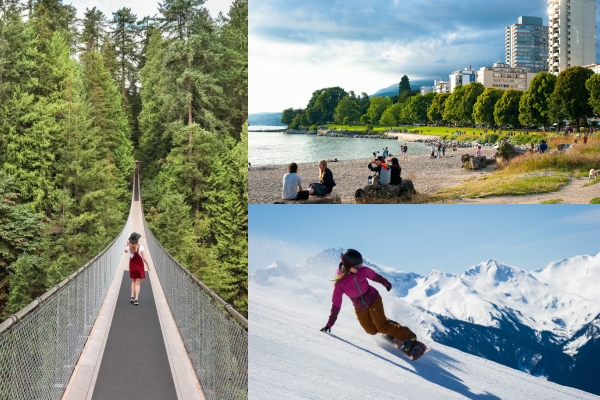
Occasional cold arctic outflows can arrive in the winter which can last a week or more and lead to snowfall.
The annual average temperature in the region is 11°C and is like other coastal cities like Seattle, Amsterdam, and London (UK).
Common Questions Immigrants Ask About Living in Vancouver
Is it Expensive to Live in Vancouver?
Yes, it’s one of the most expensive cities in Canada. It has exceptionally high real estate prices, rental prices, and cost of living. So, while it’s more affordable to live in the surrounding suburbs, even then, housing costs are still much higher than in other areas in Canada.
Is Vancouver Good for Immigrants?
Vancouver is a top destination for new immigrants to Canada. It is the most popular location for immigrants from China and other Asian countries. Its natural beauty, mild climate, and strong economy make it attractive to newcomers.
What are the Pros and Cons of Living in Vancouver?
There is no other city like Vancouver. You can look out your window and see the mountains in the distance from your urban home. It offers everything you want out of a modern international city. The economy is strong. It has world-class post-secondary institutions, and its natural wonder speaks for itself.
There are some drawbacks. The city is expensive, it has considerable traffic and its homelessness issues are well documented. Weigh the pros and cons to decide if Vancouver is the right city for you.
For more information, tools, and free webinars about living in Canada visit our Settling in Canada resource page. We’ll help you to settle successfully!
Public transit is one of the most convenient and affordable ways to get around Metro Vancouver. Whether you have just moved to Metro Vancouver or you are visiting there, you will probably have to rely on public transit to get around. In this article, you will learn all you need to know about Vancouver’s transit system and how to use it to get around Metro Vancouver quickly and cost-effectively.
Using Vancouver’s Public Transit System
Vancouver’s public transit system is managed by TransLink, the company that looks over Metro Vancouver’s transportation network. Vancouver Metropolitan Area, or simply Metro Vancouver is a group of municipalities that include the city of Vancouver and its surrounding cities such as Burnaby, Surrey, and Richmond.
There are 4 transit systems in Metro Vancouver. You will only be needing to use the first three to get around Metro Vancouver. The fourth is a commuter railway that connects Metro Vancouver with nearby towns and cities:
- SkyTrain
- Buses
- Seabus
- West Coast Express
Let’s take a deeper look at each of these systems below.
SkyTrain
SkyTrain is Metro Vancouver’s rapid transit system. Launched in December of 1985, the SkyTrain system has helped Vancouverites and visitors get around the city quickly and efficiently. At an average speed of 35 km/h, the SkyTrain is a convenient way to meet your transportation needs in Metro Vancouver.
SkyTrain uses automated trains that run on both underground and elevated tracks throughout the city. Since it mostly runs on elevated tracks, the transit system was named SkyTrain.
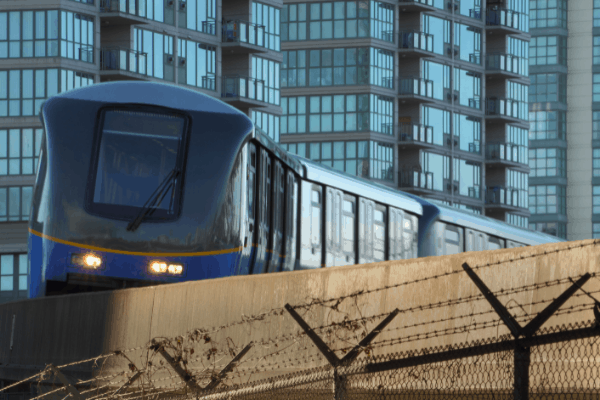
Buses
Buses are the most common way of using public transit in Canadian cities. The SkyTrain system along with buses is enough to serve most of your transportation needs around the Metro Vancouver area. Buses run through neighbourhoods at frequent timings from 5:00 AM to 1:00 AM.
Buses connect different parts of the city to major destinations and SkyTrain stations. You can get almost anywhere in Metro Vancouver by using buses. However, the longer the distance, the more buses you will probably have to change, resulting in longer travel times. If you plan on using public transit often, you can open Google Maps and look at the best routes to get to your destination. Oftentimes, the best way to get to your destination could be by using both SkyTrain and the bus.
[cjtoolbox name=’Renting Webinar’]
Related Posts:
SeaBus
Vancouver’s SeaBus is a ferry service that connects the city of Vancouver to North Vancouver by crossing the Burrard Inlet. The SeaBus system operates from 6 AM to 1 AM from Monday to Saturday and from 8 AM to 11 PM on Sundays and Holidays.
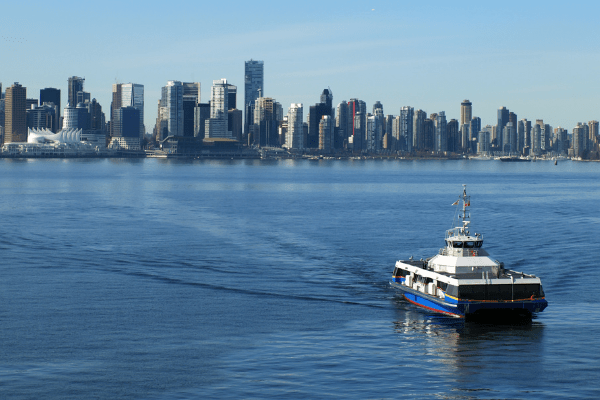
Vancouver SeaBus
Throughout the day, you can board a passenger vessel every 15 minutes. However, on Sundays and evenings of the rest of the week, a vessel will only come every 30 minutes. This is because, during the day, 2 passenger vessels are in service while during the evenings and Sundays, only 1 vessel is getting passengers across the Inlet.
West Coast Express
The West Coast Express is a commuter railway that connects the cities of Vancouver and Mission. It runs from Waterfront Station in Downtown Vancouver to Mission City Station in Mission. Between Vancouver and Mission, it stops at 6 stations. In total, the West Coast Express covers 8 stations, stretching over 69 kilometres. It takes approximately 1 hour 15 minutes to make the journey from Waterfront Station in Vancouver to Mission City Station through the West Coast Express.
Public Transit Fare in Metro Vancouver
Metro Vancouver is divided into 3 fare zones when it comes to its public transit system. If you are using either the SkyTrain or the SeaBus, the amount you pay is based on how many fare zones you cross. However, if you are on a bus, you will be charged for a one-zone ride no matter how many zones you cross.
If you are travelling on weekends/holidays or after 6:30 PM on weekdays, you will also be charged a one-zone fare. This applies even to SkyTrain and SeaBus fares. It is important to know how many zones you are going to cross on your trip and when so you know how much you will be needing to pay.
Public Transit Fare Zones
Fares zones divide metro Vancouver into 3 zones. If you are using SkyTrain or SeaBus, you need to keep these in mind because crossing one or more of these zones will require you to pay more for your ride. Keep in mind that the West Coast Express has completely different zones as it goes outside the Metro Vancouver region.
The fares listed below are for bus, SkyTrain, and SeaBus journey and are for each fare zone in Metro Vancouver:
1-Zone Fare – $3.05
2-Zone Fare – $4.35
3-Zone Fare – $5.90
Concession Fares
Children/ youth between 5 and 18 years of age and seniors over 65 years of age are eligible for concession fares. Concession fares are a discounted version of the regular fare for each zone. Like the regular fare, the numbers listed below only apply to buses, SkyTrain and SeaBus.
Here are the discounted concession fares for each fare zone:
1-Zone Concession Fare – $2.00
2-Zone Concession Fare – $3.00
3-Zone Concession Fare – $4.05
Here, you will find TransLink’s guide to fare zones and the full fare pricing table. You will also find all your options for paying fares on buses, SkyTrain and SeaBus.
West Coast Express
The fare system for the West Coast Express can get a little complicated. In this section, I will try to break it down. The West Coast Express line has 8 stations that are divided into 5 zones. Before I explain any further, let’s take a look at the 5 zones in the West Coast Express.
1 Zone: Waterfront Station (Downtown Vancouver) – Station 1
2 Zone: (No stations)
3 Zone:
- Moody Center (Port Moody) – Station 2
- Coquitlam Central (Coquitlam) – Station 3
- Port Coquitlam (Port Coquitlam) – Station 4
4 Zone:
- Pitt Meadows (Pitt Meadows) – Station 5
- Maple Meadows (Maple Ridge) – Station 6
- Port Hanley (Maple Ridge) – Station 7
5 Zone: Mission City Station (Mission) – Station 8
So what do these zones mean for you as a traveller? If you travel from Waterfront Station (Downtown Vancouver) to Mission City Station, you would have to pay a full 5-zone fare. This is because there are 5 zones between Waterfront and Mission City. However, if you were to travel from Mission City to Pitt Meadows, you would only have to pay a 2-zone fare. This is because you will have to travel through 2 zones to get to Pitt Meadows.
In general, you will have to pay somewhere between $6 – $13 for a regular one-way ticket. The price would drop to around $4 – $8 for a concession ticket. Remember, the more zones you cross, the more your ticket will cost.
Click here for TransLink’s guide to learn more about the West Coast Express and its fare system. This guide also has the full fare pricing table so if you are planning to use the West Coast Express, make sure to check that table before you purchase your ticket.
Increase Public Transit Ease with a Compass Card
Compass cards are the most convenient way to pay for fares in Metro Vancouver. Not only are they easy to use but they will also save you money. A Compass card is a fare card you can use to pay fares for buses, SkyTrain, SeaBus, and the West Coast Express.
There are two ways you can use your Compass card. The first is to add stored value to your card. Stored value is the amount of money you have added to your Compass card. You can use this money to pay for fares whenever you use the public transportation system.
The second way you can use your Compass card is by buying passes. There are 2 types of passes; day passes and monthly passes. As you may have guessed, day passes allow unlimited use of public transportation for a day while monthly passes allow unlimited travel for a month. Keep in mind that monthly passes expire at the end of the month, not after 30 days. Because of this, you cannot buy a monthly pass after the 15th of every month.
So why is a Compass card the best way to pay for fares. Compass cards will charge you less money than regular fares. You can compare how much it would cost to pay for adult fares by cash and by a Compass card.
| Zone | Cash | Compass Card |
| 1 | $3.05 | $2.45 |
| 2 | $4.35 | $3.55 |
| 3 | $5.90 | $4.60 |
If you plan on using the public transportation system a lot, you should consider getting a Compass card. Over time, paying by cash will really start to add up to your cost of living.
How to Use Your Compass Card
Whenever you enter a bus, you will need to tap your Compass card to the card reader inside the bus. This will automatically pay for your ride, as long as you have enough balance on your card. To use the compass card on SkyTrain, SeaBus, and the West Coast Express, you need to tap the card before you enter and exit so the card reader knows how many zones you travelled and charge you accordingly.
Where to Buy a Public Transit Compass Card
There are many places where you can buy and reload your Compass Card. The easiest way is to get one online. Visit this site to purchase a Compass card online. Once you have paid for the card, it will be mailed to your location in Canada.
Another way to buy and reload Compass cards is through Compass retailers and Compass Vending Machines (CVMs). Compass retailers are any stores that sell compass cards. You can find CVMs at every SkyTrain, SeaBus and West Coast Express station. For a map of all the CVMs and Compass retailers in Metro Vancouver, click here. You will have to pay a $6 refundable fee when you buy a Compass card.
You can also buy a Concession Compass card. Anyone eligible for concession fares is also eligible for a Concession card. Just like concession fares, Concession cards will charge you less money for each trip. Regular Compass cards are blue while Concession cards are orange. Note that you cannot buy a concession card at CVMs.
You can return the compass card and collect your $6 fee once you are done using the card. This is especially useful for visitors in Metro Vancouver as they will not have to worry about the $6 fee to purchase the card.
To learn more about Compass cards, visit TransLink’s guide to Compass Cards. If you want to learn how to use your Compass card, click here.
Vancouver’s public transit system is not that hard to understand. It might seem complicated online but once you start using it, everything will become clear and make more sense. Taking the time to understand how the public transit system works in Metro Vancouver will help you save time and money in the long run.
For more information, tools, and free webinars about living in Canada visit our Settling in Canada resource page. We’ll help you to settle in Canada successfully!
Looking for the perfect Vancouver neighbourhood? Trying to find a neighbourhood that suits your lifestyle and needs for a rental? Whether you seek a neighbourhood that is close to work or one with a strong sense of community, you have great choices.
All Vancouver neighbourhoods have a different style to match the rental you desire. Yaletown is a higher-end downtown neighbourhood, whereas Kitsilano is a trendy neighbourhood close to the water. Depending on your preferences for lifestyle and location, the rental rate can vary greatly.
1. West End Vancouver Neighbourhood (Downtown)
The West End of Vancouver (located on the west side of downtown) is a wonderful and diverse neighbourhood to live in. it is an attractive place for entrepreneurs and business-minded individuals. If you seek a Vancouver neighbourhood situated close to the office while staying within the energy of the people, this is the one for you!
To learn more about moving to Vancouver, Download our FREE ebook today!
[cjtoolbox name=’Vancouver Ebook’]
Recommended Posts:
- Public Transit in Vancouver | Get Around with Ease
- Getting Your Driving License in Vancouver, BC
- What to Know About Living in Delta, British Columbia
- Settle in Canada with Confidence and Ease
2. Yaletown Neighbourhood (Downtown)
Although Yaletown may be the best place to live in terms of location, it is one of the more expensive and already occupied Vancouver neighbourhoods. Yaletown is definitely one of the trendiest neighbourhoods to live in but will cost you a pretty penny to live there.
3. Killarney Neighbourhood
According to Vancouver Magazine, Killarney is an area that still has the opportunity to find a home for families. Vancouver is exploding with people, making it hard to find a starter home for many people. This neighbourhood is ideal for young families looking to stay integrated into the Vancouver culture, and is an ideal space to start up!
4. Kitsilano Neighbourhood
Located conveniently close to Kits Beach (one of the best city beaches in the world according to a number of international travel magazines), Kitsilano is a popular area to live. Compared to other neighbourhoods, Kitsilano has a mix of outdoor recreation opportunities as well as a focus on organic foods and healthy living.
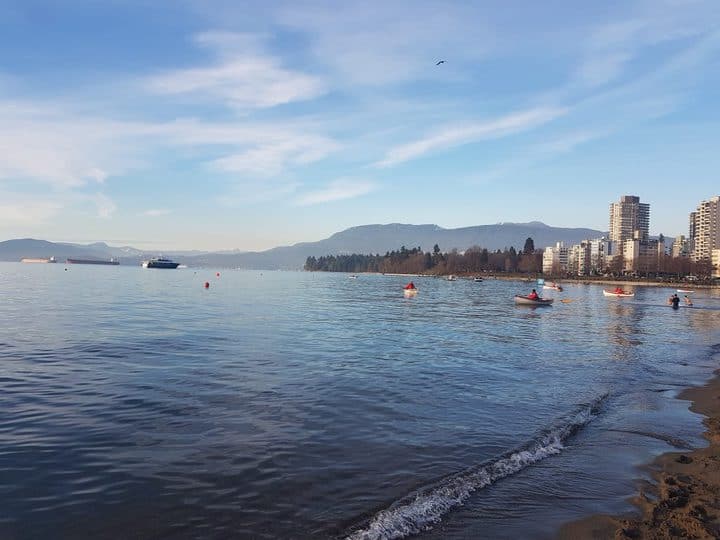
5. Fairview Neighbourhood
Fairview is a popular area filled with a number of tourist attractions that draw attention to the neighbourhood. In particular, this Vancouver neighbourhood has Granville Island. Granville Island is a small island located in the middle of the city. Described as an urban oasis, this attraction contains plenty of restaurants, stores, cafes, and other small businesses.
6. Kerrisdale Neighbourhood
The Kerrisdale neighbourhood is an area filled mainly with residents who have been there for many years. The area is a great option for retired individuals or those looking for a slower pace of life. The neighbourhood is often recognized for its popular Kerrisdale Village (also known as “The Village”). Kerrisdale Village is a shopping area located in the center of Kerrisdale that contains some of Vancouver’s best shops.
7. Riley Park Neighbourhood, Vancouver
Many will know Riley Park because of the Olympic Centre and Nat Bailey Stadium that reside within it. This thriving area is home to various types of shops and food venues to keep anyone engaged and entertained. Of course, Riley Park consists of more than the greenspace and the attractions that make it well known. Riley Park has numerous communities that span from 16th to 41st street.
8. Marpole Neighbourhood
Close to the international airport in Richmond, the Marpole neighbourhood is a bustle of activity. Being the main gateway to the airport results in higher traffic, but aside from the busy street, it is a great Vancouver neighbourhood to consider. Marpole has a number of residential areas that are family-oriented. The availability of nightlife is less than that of busier neighbourhoods, but instead, the area has more substantial yards and homes.
9. Lynn Valley North Vancouver Neighbourhood
Being one of the northern Vancouver neighbourhoods, Lynn Valley is a popular area for those looking to be away from the busyness. According to the District of North Vancouver, the central hub of the neighbourhood is gaining momentum and will be undergoing some large transformations. Be sure to check out this neighbourhood soon, as its popularity will only increase!
10. University of British Columbia Neighbourhood
The University of British Columbia (UBC) has become one of the popular Vancouver neighbourhoods to live in. The school itself is an attractive feature to draw students and teachers to the area. Over the years, the area has become an increasingly popular place to call home. Located in the west of Vancouver, there has been an increase in residential buildings, services, and other shops built.
